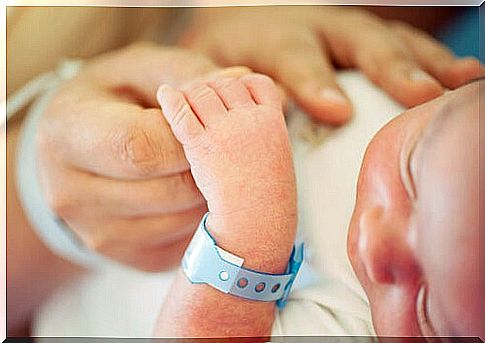The Development Of The Bones In The First Months

Are you interested in knowing how the development of the bones takes place during the first months of a baby’s life? Bone formation in the baby begins in the womb as the fetus develops.
The bones begin to take shape between week 15 and week 20 of pregnancy. The basic bone structures are formed around the 7th month of pregnancy.
Around the 7th month of pregnancy, a baby has complete, soft and flexible bones that allow it to remain comfortable in the womb until it is born.
However, the process does not stop here. After birth, the development of the bones continues rapidly.
A baby’s skeletal system
A baby’s skeleton consists of 270 bones when they are born. This figure changes a bit as some of the bones in the skull fuse together while others occur in the wrists. At the end of this process, as adults, we have 206 bones.
The development of the bones occurs throughout life. However, the development of the bones through the first ways of life is different because it happens at a considerably fast rate.
This is especially the case during the first two years of childhood. Bones are formed by blood vessels, nerves, collagen and living cells, called osteoblasts. Osteoblasts shape the bones, and are cells that feed the bones.
These living cells are the ones that allow the bones to model themselves constantly. Osteoblasts remove old bone cells, replacing them with new bone tissue that is more numerous and resistant.
This is what allows the body to grow. An individual’s growth can be affected by several aspects from birth onwards.
Factors affecting the development of the bones during the first months of life
1. Genetics
Genetic potential is an innate factor that can affect up to 80% of a baby’s development, as long as it is not disturbed by external factors.
This means that if the parents are tall, then there is a high probability that the baby will also be tall. Conversely, this also applies if the parents are low. This factor begins to affect a child’s development after the age of two.

2. Food and nutrition
A fundamental factor that begins to take effect from the beginning of fetal development is food and nutrition.
A balanced diet during pregnancy will ensure the passage of nutrients through the placenta. This is directly related to the growth and metabolic processes of the fetus in the future.
After birth, the baby should be fed breast milk until 6 months of age. Through breastfeeding, a mother’s diet should be balanced so that she provides her baby with all the necessary nutrients that it needs in order to develop through her breast milk.
As a babies grow, they will need complementary foods that meet all their needs.
3. Affection
This is a very important factor for a child’s growth. It has been proven that children who lack affection tend to grow less.
It probably occurs because they are depressed, and filled with stress and anxiety. It has the power to affect the brain in the long run, which causes it to produce large amounts of a hormone called somatostatin.
Somatostatin affects the secretion of growth hormone, which is necessary for optimal development.
4. Sleep
Sleep is incredibly important for growth. The highest production of growth hormone occurs through the night. Therefore, it is recommended that children sleep early.
5. Physical training
Physical activity helps keep the body and mind healthy. Babies need to move so that their bones and muscles can develop endurance.
Children should have at least half an hour to play outside – every day.

Physical activity also helps the body to be in a good condition. Sunlight is also important for a child’s development. It allows the body to absorb vitamin D, which is important for the growth and proper development of the bones.
In conclusion, the development of the bones in the first months of life is an important part of children’s overall development.
Through this stage, and for the rest of their lives, parents should make sure that they provide their children with all the necessary aspects so that the process can occur as it should.









